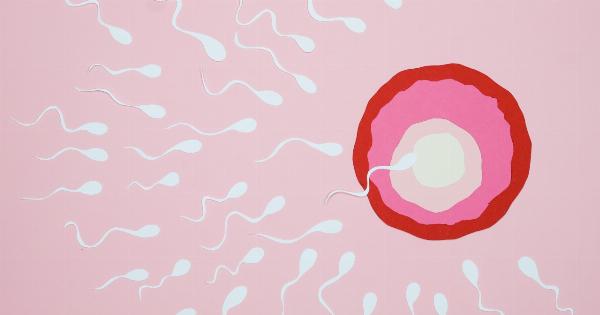In vitro fertilization (IVF) is a widely used assisted reproductive technology that helps couples struggling with infertility to conceive.
It involves fertilizing an egg with sperm in a laboratory setting and then transferring the resulting embryo into the woman’s uterus. IVF has revolutionized the field of reproductive medicine and has provided hope to millions of couples worldwide.
One aspect of the IVF process that often raises questions is the freezing of sperm. Sperm freezing, also known as cryopreservation, allows for the storage of sperm for future use.
This can be particularly beneficial for individuals who may face certain circumstances that affect their fertility, such as undergoing cancer treatments or having a low sperm count. However, some individuals may wonder whether freezing sperm can have any negative effects on the outcome of IVF.
The Freezing Process: How Does It Work?
Sperm freezing involves the preservation of sperm cells at extremely low temperatures, usually around -196 degrees Celsius (-320 degrees Fahrenheit).
This freezing process halts the biological activity of the sperm cells, effectively putting them into a state of suspended animation. The sperm is typically mixed with a special cryoprotectant solution to prevent ice crystals from forming, which could damage the cell membrane and potentially render the sperm unusable.
Once properly frozen, the sperm can be stored for long periods, often years, without significant loss of quality. This allows individuals to maintain their fertility potential by preserving viable sperm for future use.
When the time comes for IVF, the frozen sperm can be thawed and used in the fertilization process.
Does Freezing Sperm Affect Its Viability?
One of the main concerns individuals may have regarding frozen sperm is whether the freezing process negatively affects its viability. When it comes to IVF, sperm quality plays a crucial role in the success of fertilization and embryo development.
Therefore, it is crucial to determine whether frozen sperm can still effectively fertilize an egg.
Studies have shown that sperm freezing, when conducted using the appropriate protocols and techniques, does not significantly impact the viability of the sperm.
The cryoprotectant solution used during the freezing process helps protect the sperm from damage caused by the freezing and thawing process. While it is natural for some sperm cells to be lost during the freezing process, the majority of the remaining cells remain viable and can successfully fertilize an egg.
In fact, some studies have even suggested that freezing sperm could potentially improve its functionality.
One possible explanation is that the freezing process may eliminate some of the less motile or abnormal sperm, leaving behind a higher concentration of healthy and viable sperm.
Does Freezing Sperm Affect the Success Rate of IVF?
Another critical aspect to consider is whether freezing sperm affects the overall success rate of IVF procedures.
Numerous studies have been conducted to answer this question, and the consensus seems to be that frozen sperm does not significantly impact the success rate of IVF.
A systematic review published in the journal Fertility and Sterility examined the outcomes of IVF using fresh and frozen sperm samples.
The researchers concluded that there was no statistically significant difference in the success rates between the two groups, suggesting that frozen sperm is just as effective as fresh sperm for IVF.
Furthermore, a study published in the journal Human Reproduction analyzed the records of over 11,000 IVF cycles and found no differences in fertilization rates, implantation rates, or clinical pregnancy rates when comparing fresh and frozen sperm samples.
Advantages of Using Frozen Sperm
While freezing sperm does not appear to have a detrimental effect on IVF outcomes, there are several advantages to using frozen sperm in the IVF process.
Firstly, freezing sperm allows individuals to preserve their fertility potential in situations where their reproductive health may be at risk.
Those undergoing cancer treatments, such as chemotherapy or radiation, may experience temporary or permanent infertility as a result of the treatment. By freezing sperm prior to treatment, individuals can increase their chances of successfully starting a family once they have completed their cancer treatment.
Secondly, freezing sperm allows for better coordination between the male and female partners during the IVF process. In some cases, the male partner may not be available on the day of egg retrieval or may have difficulty producing a fresh sperm sample.
By using frozen sperm, the IVF process can proceed more smoothly, regardless of the male partner’s availability or location.
Lastly, freezing sperm provides a backup option in case of unexpected circumstances. IVF cycles can sometimes be unpredictable, and factors such as poor ovarian response or cycle cancellation can occur.
Having frozen sperm available ensures that even if the cycle does not proceed as planned, there is still a chance to continue with IVF using the stored sperm.
Conclusion
In summary, freezing sperm for IVF does not appear to have a negative impact on the outcome of the procedure.
The freezing process, when conducted using the appropriate techniques, does not significantly affect the viability of the sperm or the success rates of IVF. In fact, freezing sperm provides numerous advantages, including the ability to preserve fertility potential, improve coordination during the IVF process, and provide a backup option for unexpected circumstances.


























